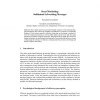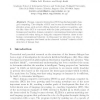117
click to vote
NIME
2001
Springer
15 years 6 months ago
2001
Springer
This paper reviews the existing literature on input device evaluation and design in human-computer interaction (HCI) and discusses possible applications of this knowledge to the d...
102
click to vote
GI
2009
Springer
15 years 6 months ago
2009
Springer
Abstract: Store chains and service providers beguile customers with a pleasant shopping atmosphere often realized by installing scent diffusers to evaporate overwhelming fragrances...
111
click to vote
DSVIS
2003
Springer
15 years 7 months ago
2003
Springer
A number of design models have been proposed in the area of Human-Computer Interaction (HCI) to support user-centered system design. el, abstract task models and detailed interface...
121
click to vote
KES
2005
Springer
15 years 7 months ago
2005
Springer
Abstract. Human-computer interaction (HCI) has fundamentally changed computing. The ubiquity of HCI can be seen in several kinds of application areas, such as text editing, hyperte...
135
click to vote
ACMDIS
2006
ACM
15 years 8 months ago
2006
ACM
Human-Computer Interaction (HCI) often focuses on how designers can develop systems that convey a single, specific, clear interpretation of what they are for and how they should b...
111
click to vote
HICSS
2006
IEEE
15 years 8 months ago
2006
IEEE
Bandura’s theories of self- and collective efficacy are widely recognized in many fields, including psychology and management, but have been largely unnoticed by the Human-Compu...
100
click to vote
IEEEARES
2007
IEEE
15 years 8 months ago
2007
IEEE
This paper is the continuation of a series of related work about experimentation of alternative ways of interaction with computers for disabled people (concretely with users suffe...
130
click to vote
ACHI
2008
IEEE
15 years 8 months ago
2008
IEEE
Computers have been widely deployed to our daily lives, but human-computer interaction still lacks intuition. Researchers intend to resolve these shortcomings by augmenting tradit...
122
click to vote
OZCHI
2009
ACM
15 years 9 months ago
2009
ACM
For many, an interest in Human-Computer Interaction is equivalent to an interest in usability. However, using computers is only one way of relating to them, and only one topic fro...



